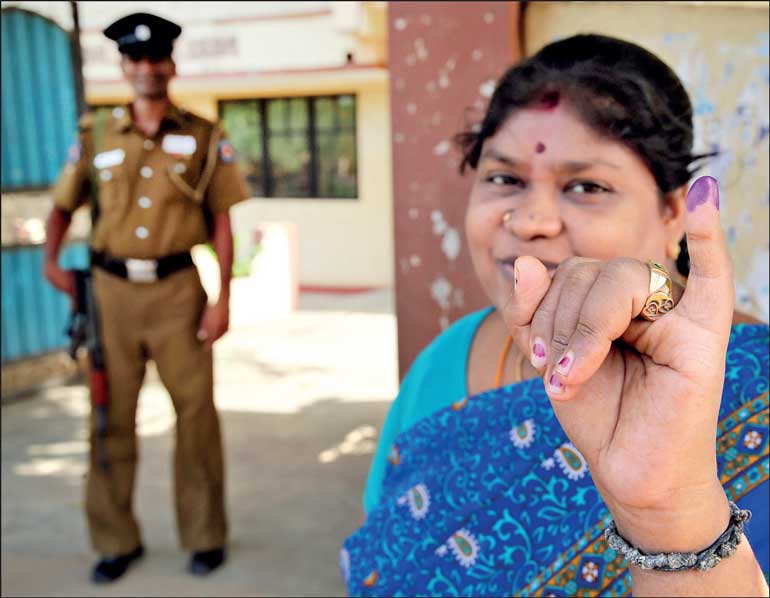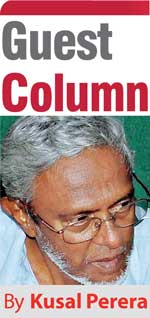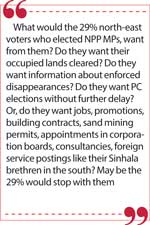Saturday Feb 21, 2026
Saturday Feb 21, 2026
Saturday, 30 November 2024 00:24 - - {{hitsCtrl.values.hits}}

Post-war issues the north-east wanted answers for, will not get trashed merely because 29% in N-E voted for NPP
 Plenty is written about the JVP-led NPP in 2024 September-November elections, with many comparisons and much praise. It is a historic achievement, no doubt. It was only possible with an amateur politician Gotabaya elected president by 6.9 million voters in 2019 November totally messing up everything possible. Politically naïve and meek too, he was a total contrast to what he was projected to be, a “Hitlerite” leader. The #GotaGoHome protest campaign brought to Galle Face Green turned into a violent protest in four weeks. Re-labelled as “Aragalaya” it wrecked the entirety of traditional party politics leaving the JVP/NPP to claim they fit in best to clean up the “system”.
Plenty is written about the JVP-led NPP in 2024 September-November elections, with many comparisons and much praise. It is a historic achievement, no doubt. It was only possible with an amateur politician Gotabaya elected president by 6.9 million voters in 2019 November totally messing up everything possible. Politically naïve and meek too, he was a total contrast to what he was projected to be, a “Hitlerite” leader. The #GotaGoHome protest campaign brought to Galle Face Green turned into a violent protest in four weeks. Re-labelled as “Aragalaya” it wrecked the entirety of traditional party politics leaving the JVP/NPP to claim they fit in best to clean up the “system”.
Within this historic win, the north-east poll is spoken of as the greatest achievement ever by a southern Sinhala political leadership. This is nevertheless not the first time the north-east voted overwhelmingly for a Sinhala presidential candidate. At the 2010 Presidential elections, over 60% of the north-east voted for General Sarath Fonseka, commander of the army when the war concluded in May 2009. He won all five north-east districts while NPP lost Batticaloa this election. But General Fonseka lost all districts in the Sinhala South. It was not a case of Tamil voter accepting Fonseka as their trusted candidate. It was a “vote of vengeance” against Rajapaksa.
Vote of vengeance
This 2024 too in north-east, it was a vote of vengeance. There is no denying the fact, a community wholly deprived of their decent and dignified life, a community ignored by their very political leaders, would at one point use the vote to tell the leaders they are no more worth the Tamil vote. It is a fact, the north-east Tamil people were left to themselves to agitate on their major issues, with especially the ITAK leadership firmly rooted in Colombo, supporting the Wickremesinghe government from 2015 January to end 2019. This anger in the Tamil community was brewing during the time the mothers and wives continued a 2,000-day Sathyagraha demanding information on enforced disappearances, with no established Tamil political leadership standing with them. In the north-east the war affected wanted land occupied by security forces, colonisation by Sinhala people, continuous surveillance of private and community life, total militarisation the LLRC wanted transformed into civil administration solved as priority issues with their local issues too. Almost three years ago on 7 December 2021 in the Daily Mirror article titled, “TNA should turn to People to come out of wilderness” I wrote, “Colombo centred politics of ITAK with more trust and faith in the UNP leadership gave space for smaller groups in North-East protests though without a clear perspective and with no practical programme for mass participation. Yet they fractured Tamil politics as clearly seen this 2020 August election. TNA was reduced to 10 from the 16 seats they won in 2015 with a reduced vote of 327,000 from over 516,000 previously. They lost 06 seats broken up between 04 Tamil groups. Sadly, ITAK learns nothing from their political beating, coming out after 05 years without even a draft copy of a Constitution in hand and electoral presence badly reduced.”
Factional fighting for ITAK leadership
 Even after the harsh treatment at the 2020 August election, ITAK leadership did not get back to the “People”. They were more interested in factional fighting for ITAK leadership. How much was ITAK left thereafter in this 2024 September election? They ended with 257,813 votes and two seats less with only eight remaining. Which means to say, they have lost 50% of the votes they polled in 2015 and half the seats too. It was disenchantment, frustration and anger against ITAK that saw 11 independent groups and three new Tamil political parties contesting Jaffna this time. It was also the reason for 24.8% in Jaffna district and 20.4% in Vanni to vote for the party expected to form the next Government, the JVP/NPP.
Even after the harsh treatment at the 2020 August election, ITAK leadership did not get back to the “People”. They were more interested in factional fighting for ITAK leadership. How much was ITAK left thereafter in this 2024 September election? They ended with 257,813 votes and two seats less with only eight remaining. Which means to say, they have lost 50% of the votes they polled in 2015 and half the seats too. It was disenchantment, frustration and anger against ITAK that saw 11 independent groups and three new Tamil political parties contesting Jaffna this time. It was also the reason for 24.8% in Jaffna district and 20.4% in Vanni to vote for the party expected to form the next Government, the JVP/NPP.
Why then did Batticaloa Tamils remain with ITAK? In Batticaloa, with Shanikiyan Rasamanickam representing ITAK, often standing with protesting and agitating people, appearing for people against police repression, ITAK wasn’t missing in Batticaloa. And I wrote in the article mentioned above, “What impact People could make with ‘collective effort’ should by now be known to young politician Rasamanickam, who marched all 05 days in the ‘P2P’ across East to North in early February (2021).” Batticaloa Tamil and Muslim people had little grouse to settle with ITAK and proved the vote polled by NPP in other districts in north and east were a “vote of vengeance” against their Tamil leaders.
With 29% polled by the NPP, there are now 12 NPP MPs in north-east that include four Sinhala MPs from Digamadulla and two from Trincomalee. This cultural distinction cannot be simply forgotten, although NPP and Sinhala-Buddhists keep insisting there are no more ethno-religious divisions, as every citizen is a “Sri Lankan” and will be treated equally. There is nothing that can be identified as a “Sri Lankan culture” though, apart from Sinhala, Tamil and Muslim cultural identities. They remain Sri Lankan “Tamils” different to South Indian Tamils. They remain Sri Lankan “Muslims” different to Pakistani or Bangladeshi Muslims. There is no way in deleting their Tamil or Muslim cultural identities, by calling them “Sri Lankan”. Insisting on a “Sri Lankan” identity would impose the Sinhala-Buddhist identity as the majority identity, when cultural identities are artificially erased.
Dominance is evident
That “dominance” is quite evident with no “ethno-religious equality” in day-to-day life. Sinhala-Buddhist dominance is quite conspicuous in how the “State” represents Sinhala-Buddhists in attending to civil issues. In how the ICCPR Act was used for just the opposite of what it was meant to be used for. In how an innocent Muslim village woman in Hasalaka was arrested by the police and remanded by the Magistrate for wearing a dress with a motif that was interpreted as the Buddhist “chakra”. In how Sinhala-Buddhist teachers, principals and provincial administrators treated their long time Muslim working colleagues immediately after the Easter Sunday tragedy. It is proved, the case against Dr. Shafi was totally fabricated, as he was a Muslim professional.
Post-war issues the north-east wanted answers for, will not get trashed merely because 29% in N-E voted for NPP. Though President Anura Kumara presenting his Government’s policy statement at the inauguration of the first session of this new Parliament said, “Our nation has endured immense suffering due to ethnic conflicts. This soil has been soaked with enough blood, and rivers have flowed with the tears of countless people. Mistrust, suspicion, and anger among communities have grown to alarming levels” and pledged, “As representatives of this Parliament, our foremost responsibility is to ensure that our future generations inherit a nation free of such suffering. We owe it to them to create a state where such tragedies are not repeated”, he nor his party manifesto pledged to de-militarise and establish a neutral civil administration in N-E.
Nor was there a promise to provide all information on enforced disappearances, the affected families kept demanding all these years. There was also no mention of Tamil land being colonised by Sinhala people, ignored in the NPP election manifesto. Absolutely no mention about archaeological sites being labelled as sacred Buddhist sites with State patronage, though in the policy statement President Anura Kumara pledges “I assure you with full responsibility that we will not allow a resurgence of divisive racist politics in our country. Similarly, no form of religious extremism will be permitted to take root.” (all quotes – https://www.presidentsoffice.gov.lk/ website)
Will New Delhi forget the “Indo-Sri Lanka Accord” of 1987?
Taking all those promises as genuinely made, the 10 Crore Indian Rupee question that remains to be answered is, can New Delhi allow the NPP Government to go along with those statements, ignoring Pan-Tamil politics of Tamil Nadu? Will New Delhi forget the “Indo-Sri Lanka Accord” of 1987 and allow President Anura Kumara to continue without any mention about 13A and where they stand on it? Will ITAK and other Tamil political parties leave “devolution” to be decided as the NPP wants and will the NPP north-east MPs stay cold on PC elections?
Will they sing along with the NPP “no divisive politics, only Sri Lankan”?
Most importantly, what would the 29% north-east voters who elected NPP MPs, want from them? Do they want their occupied lands cleared? Do they want information about enforced disappearances? Do they want PC elections without further delay? Or, do they want jobs, promotions, building contracts, sand mining permits, appointments in corporation boards, consultancies, foreign service postings like their Sinhala brethren in the south? May be the 29% would stop with them.
But the larger majority of the 71% who did not vote NPP, seems to want a political answer to their long-time grievances. They seem to exploit the quiet post-election social space to hype their political demands with “Maaveerar Naal” ceremonies brought to the open than any time before. In north-east it seems, people are not going home after casting their vote. How President AKD and his NPP Government would accommodate that Tamil politics, is what matters.